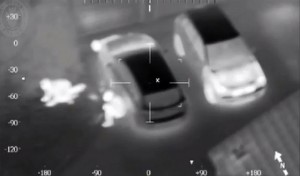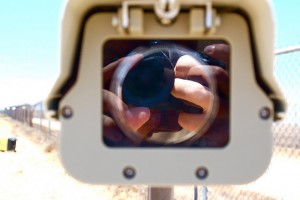 Not all surveillance cameras are created equally. It may seem as simple as selecting a surveillance camera and popping it into place, but what about the external factors that affect the quality of recorded images? One of the top concerns for industry professionals and end-users alike is a cameras ability to function in the dark or varied light conditions. Whether you’re using interior or external cameras, their ability to function under varied light conditions is paramount. Our experts at Perfect Connections, Inc. understand the importance of a surveillance system that doesn’t quit when the sun goes down. We are a licensed security systems company that has been providing comprehensive security solutions to businesses throughout northern and central New Jersey for over 25 years.
Not all surveillance cameras are created equally. It may seem as simple as selecting a surveillance camera and popping it into place, but what about the external factors that affect the quality of recorded images? One of the top concerns for industry professionals and end-users alike is a cameras ability to function in the dark or varied light conditions. Whether you’re using interior or external cameras, their ability to function under varied light conditions is paramount. Our experts at Perfect Connections, Inc. understand the importance of a surveillance system that doesn’t quit when the sun goes down. We are a licensed security systems company that has been providing comprehensive security solutions to businesses throughout northern and central New Jersey for over 25 years.
What challenges do different lighting conditions pose to surveillance cameras? The most obvious is the absence or lack of light. Unless your cameras are True Day Night it is likely that they will not be able to pick up fine details in the lack of light. Another common issue is the effect of light glare. Problematic glare can come from car headlights to poorly placed exterior lighting fixtures. Glare will disrupt the sensors in the video camera and the recorded footage can be rendered useless. It is important to take lighting conditions into consideration when choosing and installing cameras as it will impact the overall effectiveness of your system. What good is a camera that captures grainy unclear images or blanks out for seconds at a time?
Fortunately there have been vast improvements in the surveillance industry that are changing the game when it comes to light adaptation capabilities. According to Greg Peratt, Senior Director of the Panasonic Video Solutions Integration Team, there are IP (Internet Protocol) cameras that can capture detailed footage in lighting less than .01 lux illumination. Lux illumination is the metric measurement for how much light falls on an object. A measurement of 1 lux, “equals the amount of light that falls on a one-square-meter surface that is one meter away from a single candle.” Therefore a camera that can capture detailed images in less than .01 lux illumination is not only impressive, it’s advantageous.
Another helpful advancement in the case of low or varied light is the Infrared Cut-Filter Mechanism (IRCF). This filter is automatically lifted or lowered in front of the camera’s sensor depending on the light levels. The IRCF helps block out disruptive infrared light that can come from sunlight or certain lighting fixtures and it ultimately improves the camera’s low-light performance. When light levels are low-typically at night-is when the filter is automatically lifted from in front of the sensor. Cameras that have this feature are considered to have True Day Night capabilities.
The only hitch with this technology is color is often distorted or lost completely. However, the camera is still able to capture a clear black and white image and according to Steve Carney it captures an image, “…that is not only vastly more usable but also cleaner without chroma noise.” Carney points out another differentiator between True Day Night cameras and the impersonators is what happens when the IRCF is lifted or removed. In a True Day Night camera a piece of “dummy” glass will take the place of the IRCF in order to maintain focus and, “minimize the spectral offset between visible and IR light.” In other cameras the ability to remove such a filter doesn’t exist, therefore the full spectrum of visible and infrared light cannot be taken advantage of.
Other features to look for when considering Day Night cameras are the shutter speeds and any tinting on the camera housing. Varying shutter speeds affect the amount of the light that is able to be captured. The slower the shutter, the more light is captured which isn’t always better. Often times a camera will come with a domed or “bubble” exterior housing. These “bubbles” can sometimes be tinted. Depending on your application you may or may not need tinting; sometimes the tint can have an adverse effect by decreasing visibility and obstructing image clarity.
Whether you are replacing older interior/exterior cameras or installing new, your best solution is to call on the experts. Every business and facility is different which means each will have different requirements when it comes to day/nighttime surveillance. Having a licensed security professional do an in person assessment of your facility will help determine what type of camera should be implemented and where. Our team of licensed professionals at Perfect Connections, Inc. has been providing comprehensive security solutions to businesses and facilities throughout northern and central New Jersey since 1992. We believe in personalized service that tailors solutions to your individualized needs.
If you live or run a business in Central or Northern New Jersey and would like information on any of the topics discussed above, please call 800-369-3962 or simply CLICK HERE.
Image Credit: Image by West Midlands Police-Flickr-Creative Commons

 When it comes to security systems you may have heard the term “edge technology,” “edge analytics,” or “edge devices.” What exactly do these terms mean and why are they important? When talking about security systems “the edge” is typically used when referring to video surveillance components. Every security system integrator and industry professional will likely have their own definition of what it means, but in summary “edge technology” refers to surveillance devices that operate, analyze, and record at their source versus transmitting all that information over a network to the system’s core. In traditional surveillance systems there is a central server where recorded data from peripheral devices is stored and analyzed. In an edge-based system cameras perform these functions locally.
When it comes to security systems you may have heard the term “edge technology,” “edge analytics,” or “edge devices.” What exactly do these terms mean and why are they important? When talking about security systems “the edge” is typically used when referring to video surveillance components. Every security system integrator and industry professional will likely have their own definition of what it means, but in summary “edge technology” refers to surveillance devices that operate, analyze, and record at their source versus transmitting all that information over a network to the system’s core. In traditional surveillance systems there is a central server where recorded data from peripheral devices is stored and analyzed. In an edge-based system cameras perform these functions locally. What is it about our homes that make us feel safe? Is it the sound of our kids running up and down the stairs? Is it the personalized décor? Is it the smell? Maybe it’s the locks on our doors and windows or the surrounding neighborhood? Whatever it is, we all want that feeling to last, right? Of course we do. So what are you doing to maintain the safety and security of your home? There are many tips and tricks you can use to safeguard your home, one of the best defenses is a customized comprehensive security system. As a trusted security systems provider for over 25 years, our team at
What is it about our homes that make us feel safe? Is it the sound of our kids running up and down the stairs? Is it the personalized décor? Is it the smell? Maybe it’s the locks on our doors and windows or the surrounding neighborhood? Whatever it is, we all want that feeling to last, right? Of course we do. So what are you doing to maintain the safety and security of your home? There are many tips and tricks you can use to safeguard your home, one of the best defenses is a customized comprehensive security system. As a trusted security systems provider for over 25 years, our team at 